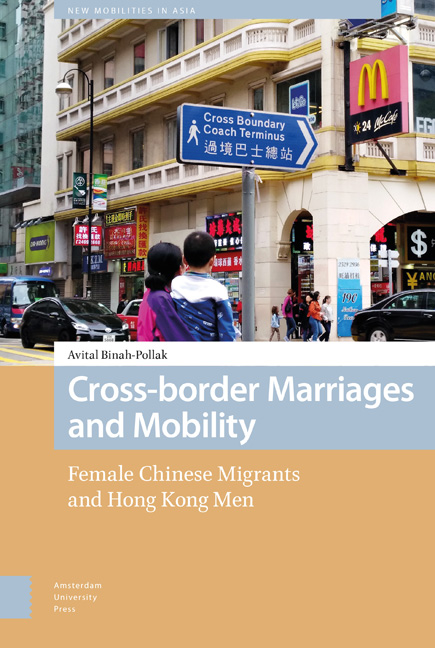Book contents
- Frontmatter
- Contents
- List of Figures and Tables
- Acknowledgments
- Introduction
- 1 The Hong Kong-China Border: A Space of Confinement and Movement
- 2 Motivations for Crossing Borders
- 3 ‘Same as Before, Living as a House Wife’
- 4 Hong Kong's Education: A Bridge to the ‘First World’
- 5 New Voices in Hong Kong: Local Identity Formation
- Concluding Thoughts: Home Is not where the Heart Is but where it Wants to Be
- Bibliography
- Index
2 - Motivations for Crossing Borders
Published online by Cambridge University Press: 21 November 2020
- Frontmatter
- Contents
- List of Figures and Tables
- Acknowledgments
- Introduction
- 1 The Hong Kong-China Border: A Space of Confinement and Movement
- 2 Motivations for Crossing Borders
- 3 ‘Same as Before, Living as a House Wife’
- 4 Hong Kong's Education: A Bridge to the ‘First World’
- 5 New Voices in Hong Kong: Local Identity Formation
- Concluding Thoughts: Home Is not where the Heart Is but where it Wants to Be
- Bibliography
- Index
Summary
It is a relatively common notion that journeys have a clear starting and ending point. But when exactly does a journey begin? Consider, for example, a German woman traveling in Thailand. At which point did her journey start? When she bought her flight ticket online? At the airport? When the airplane took off, or only when she landed in Bangkok? Perhaps her journey started when she first decided she wanted to travel to Thailand. It is not easy to put a finger on the exact ‘starting point’ of any journey – not even for tourism, let alone migration. Where do the marriage migrants I came to know in Sheung Shui come from? Where and when did their journey begin? When did they become migrants? And when (if ever) did they became Hong Kongers? Their journey's starting point is difficult to determine since their decision (like any decision) is not only ‘personal’ and is always part of a specific and unique context. I do not intend to imply that Sheung Shui marriage migrants did not have an active role in their migration process, or that they were simply ‘shaped’ by structural conditions. Yet, from an anthropological perspective, a ‘personal decision’ does not only relate to the individual. Rather, it is a constant negotiation bound to structural constraints and opportunities.
Wang Jian was the first mainland marriage migrant I came to know in Sheung Shui. When we met she was 39 years old, had been married to a Hong Kong man for 13 years, and had a daughter who was four years old. Our daughters were the same age and it was after the girls became friends that we came to know each other as well. Wang Jian had been living in Sheung Shui for a relatively long time and had many mainland marriage migrant friends. Her friends considered her to be knowledgeable about the local living situation, and often consulted her when they needed any kind of assistance. Shortly after Wang Jian and I first met we became close friends, and as the fieldwork progressed she turned out to be one of my key informants. Sitting in her cosy living room in Hong Kong, Wang Jian told me about life in the village where she grew up.
- Type
- Chapter
- Information
- Cross-border Marriages and MobilityFemale Chinese Migrants and Hong Kong Men, pp. 59 - 88Publisher: Amsterdam University PressPrint publication year: 2019

